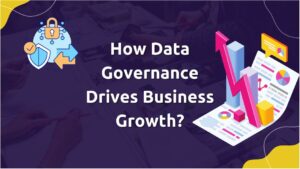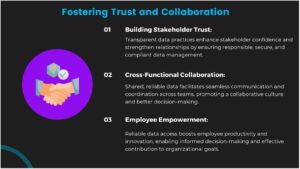
In today’s data-driven landscape, organizations that leverage data effectively gain a significant competitive edge. However, the true power of data lies not only in its mere existence but in how it is managed and governed.
Data governance emerges as a crucial factor in driving business growth, enabling companies to harness their data assets’ full potential while mitigating risks and fostering innovation.
The Strategic Role of Data Governance in Business Operations
Data governance plays a pivotal role in ensuring data quality, consistency, and integration across an organization’s operations. Establishing standardized policies and processes for managing data assets allows companies to optimize decision-making, enhance operational efficiency, and unlock valuable insights.
Optimizing Data Quality
Data quality is critical because it directly impacts the accuracy and reliability of insights derived from data analysis. Poor data quality can lead to flawed decision-making, operational inefficiencies, and potential financial losses.
By implementing data governance practices such as data profiling, data cleansing, and data validation, organizations can ensure that their data is complete, accurate, and consistent, enabling them to make well-informed decisions that drive growth and profitability.
| Did You Know? According to a study by Gartner, organizations believe poor data quality is responsible for an average of $15 million in annual losses. |
Ensuring Data Consistency
In today’s complex business environment, data often flows across multiple systems, departments, and even geographical locations. Data inconsistencies can arise due to factors such as different data formats, naming conventions, or interpretations, leading to ambiguity.
Data governance establishes a set of common data definitions, standards, and policies that ensure all teams operate with a shared understanding of data, eliminating ambiguities and fostering seamless collaboration. The benefits of data governance are far-reaching and have a profound impact on an organization’s ability to leverage data effectively.
By implementing robust data governance practices, companies can ensure data quality, consistency, and integration across various systems and departments. This, in turn, enables better decision-making, enhances operational efficiency, and unlocks valuable insights that drive business growth and profitability.
Data Integration
Organizations often deal with data residing in various siloed systems, making it challenging to gain a holistic view of their business operations and customer interactions. Data governance facilitates the integration of disparate data sources by defining common data models, metadata standards, and integration protocols.
This integration enables organizations to combine and analyze data from different domains, revealing valuable insights that can drive strategic decision-making and uncover new opportunities.
Enhancing Compliance and Risk Management
Robust data governance frameworks are essential for maintaining regulatory compliance and mitigating data-related risks that can threaten an organization’s integrity and reputation. With proper safeguards and monitoring mechanisms in place, companies can navigate complex regulatory landscapes and protect sensitive data assets.
- Regulatory Compliance – Effective data governance is essential for meeting industry regulations and avoiding costly non-compliance penalties. By establishing robust data management policies and processes, organizations can ensure that sensitive data is handled securely and in accordance with relevant regulations, such as GDPR, HIPAA, and PCI-DSS.
- Risk Mitigation – Data-related risks pose significant threats to business integrity and reputation. Data governance frameworks identify and mitigate these risks by implementing safeguards, access controls, and monitoring mechanisms.
- Audit Preparedness – Regulatory audits can be time-consuming and resource-intensive processes. With robust data governance policies in place, organizations can streamline audit processes, reduce potential liabilities, and ensure transparency and accountability.
Driving Innovation and Competitive Edge
Data governance empowers organizations to leverage their data assets for driving innovation, making agile decisions, and gaining a competitive edge in the market. By ensuring data quality and accessibility, companies can identify emerging trends, capitalize on opportunities, and tailor offerings to meet customer demands.
Data-Driven Innovation
Governed data is a powerful catalyst for innovation and market differentiation. By leveraging clean, organized, and accurate data, organizations can identify emerging trends, uncover new opportunities, and develop innovative products and services tailored to customer needs.
Agile Decision-Making
The ability to make timely and well-informed decisions is crucial for staying ahead of the competition. Data governance ensures that leadership has access to accurate and up-to-date data, enabling them to respond swiftly to market changes, capitalize on emerging opportunities, and make strategic pivots when necessary.
This agility allows organizations to adapt quickly and maintain a competitive edge in dynamic market conditions.
Customer Insights
Understanding customer behavior and preferences is crucial for delivering exceptional experiences and fostering long-term loyalty. Effective data governance ensures that customer data is accurate, organized, and accessible, enabling organizations to derive valuable insights and tailor their offerings to meet evolving customer demands.
Boosting Operational Efficiency
Effective data governance practices streamline operations by optimizing resource allocation, enabling continuous process improvement, and reducing costs associated with data inaccuracies and redundancies. Well-governed data fuels efficient business processes and drives productivity gains.
Resource Optimization
Effective data governance reduces waste and optimizes resource allocation by providing precise, up-to-date data. By eliminating redundancies and streamlining processes, organizations can allocate resources more efficiently, driving cost savings and improving overall productivity.
Process Improvement
Well-governed data is a powerful tool for continuous process improvement. By analyzing data patterns and identifying bottlenecks, organizations can identify areas for optimization and implement data-driven strategies to enhance business processes, resulting in increased efficiency and cost savings.
Cost Reduction
Inaccurate or inconsistent data can lead to costly errors and inefficiencies. By improving data accuracy and reducing redundancies through robust data governance practices, organizations can significantly lower operational costs.
Fostering Trust and Collaboration
Transparent and responsible data management practices, enabled by data governance, foster trust among stakeholders and promote cross-functional collaboration within an organization. By providing a shared, reliable data foundation, teams can work seamlessly and make informed decisions.
Future Trends in Data Governance and Business Growth
The future of data governance is poised to evolve with the integration of cutting-edge technologies like AI, machine learning, and blockchain. These advancements will automate processes, enhance data quality monitoring, and ensure data integrity, driving agile decision-making and business growth.
AI and Machine Learning Integration – The future of data governance lies in the integration of artificial intelligence (AI) and machine learning (ML) technologies. These advanced technologies will automate data governance processes, enhance data quality monitoring, and provide real-time insights for more agile decision-making.
Blockchain for Data Integrity – Blockchain technology has the potential to revolutionize data governance by ensuring data accuracy, transparency, and immutability. By leveraging blockchain, organizations can establish a tamper-proof audit trail, enhancing trust and data integrity across the entire data lifecycle.
The Evolving Role of Data Stewards – As data governance becomes more critical, the role of data stewards will evolve to become increasingly strategic. Data stewards will be responsible for championing data governance initiatives, fostering cross-functional collaboration, and driving data-driven decision-making throughout the organization.
Frequently Asked Questions
What are the key challenges in implementing data governance?
Common challenges include data silos, lack of data ownership, resistance to change, and limited resources. Addressing these through clear policies, change management, and leadership support is crucial.
How can data governance benefit small and medium-sized enterprises (SMEs)?
Even SMEs can benefit from data governance by ensuring data quality, compliance, and operational efficiency. Start small, leverage existing resources, and foster a data-driven culture.
How does data governance align with broader organizational goals?
Data governance supports strategic objectives by enabling data-driven decision-making, improving customer experiences, mitigating risks, and driving innovation. It aligns data management with business priorities.
Conclusion:
Effective data governance is no longer an option but a necessity for organizations seeking to thrive in the data-driven economy. By establishing robust data management practices, companies can unlock the full potential of their data assets, drive innovation, enhance operational efficiency, and gain a competitive edge.






